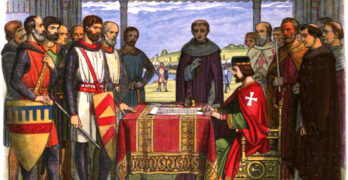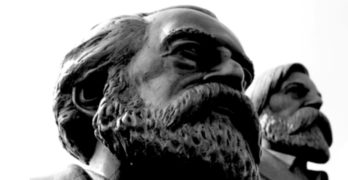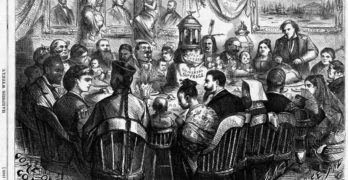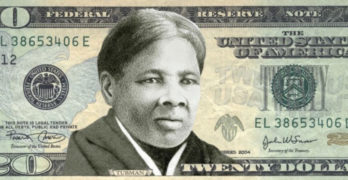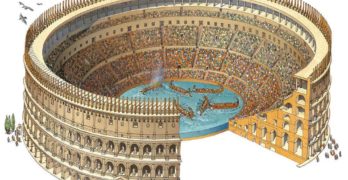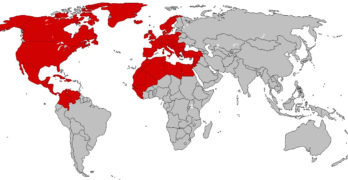 In 1999 during the presidential Republican debates in the campaign for the presidential nomination, one of the nominees was asked to name his favourite “political philosopher.” He replied that it was Jesus Christ. From that point on, most evangelical Christians in America voted for him because they thought he would represent their values based on his faith in Jesus Christ.
In 1999 during the presidential Republican debates in the campaign for the presidential nomination, one of the nominees was asked to name his favourite “political philosopher.” He replied that it was Jesus Christ. From that point on, most evangelical Christians in America voted for him because they thought he would represent their values based on his faith in Jesus Christ.
This Republican nominee should have countered the statement that Jesus Christ was not a political philosopher, but rather the very Son of God. It is not surprising that evangelical Christians are realizing that many political ties to evangelical Christianity appear to be simply for the purpose of producing political advantages.
What is a philosopher? The Oxford dictionary defines a philosopher “as a person engaged or learned in philosophy or a branch of it.” But couldn’t the same be said for Karl Marx or Plato or Socrates?
Unlike the leaders and philosophers of other religious and political movements, Jesus was no political figure; He had no connection with Herod or the Sanhedrin; He took no political action and His disciples were relatively uneducated. To call Jesus just a political philosopher is disrespectful to say the least.
Jesus Christ is Lord and God because He is the exact representative of God the Father. God said, “Let Us make man in Our image, according to Our likeness” (Genesis 1:26).
Jesus is God because He is the Word, explaining God the Father as the I AM. When Moses met God at the burning bush and received his assignment to be God’s spokesman before Pharaoh, he asked God a question and received an answer:
Then Moses said to God, “Indeed, when I come to the children of Israel and say to them, ‘The God of your fathers has sent me to you,’ and they say to me, ‘What is His name?’ what shall I say to them?” And God said to Moses, “I AM WHO I AM.” And He said, “Thus you shall say to the children of Israel, ‘I AM has sent me to you.’” Moreover God said to Moses, “Thus you shall say to the children of Israel: ‘The Lord God of your fathers, the God of Abraham, the God of Isaac, and the God of Jacob, has sent me to you. This is My name forever, and this is My memorial to all generations.’” (Exodus 3:13–15)
The Jews wanted to stone Jesus when He said to them, “Most assuredly, I say to you, before Abraham was, I AM” (John 8:58). They understood clearly that Jesus was blaspheming the name of God by claiming to be God Himself. They knew that I AM was the memorial name of God to all generations, and they did not believe Jesus was God.
They refused to believe in the deity of Jesus Christ, which means they would die in their sins. Again, on another occasion, Jesus said, “I and the Father are one,” and again the Jews renewed their efforts to stone Him.
Jesus answered them, “Many good works I have shown you from My Father. For which of those works do you stone Me?” The Jews answered Him, saying, “For a good work we do not stone You, but for blasphemy, and because You, being a Man, make Yourself God.” (John 10:30–33) According to the law, they had every right to stone Jesus because He was claiming to be the exact representation of the Father (see Leviticus 24:16).
Jesus Christ is God because He is eternal. He always has been and He will always be. There is only one Man in all of time who was both God and Man—the Lord Jesus Christ. He was crucified on the cross as the only begotten Son of God, explaining the unconditional love of God the Father to a lost and broken world.
John tells us that the promised Messiah is the very Son of God, and that Jesus, like the Father, is eternal: “In the beginning was the Word, and the Word was with God, and the Word was God. He was in the beginning with God.
All things were made through Him, and without Him nothing was made that was made” (John 1:1–3). John further says: “And the Word became flesh and dwelt among us, and we beheld His glory, the glory as of the only begotten of the Father, full of grace and truth” (John 1:14).
The prophet Isaiah says:
I saw the Lord sitting on a throne, high and lifted up, and the train of His robe filled the temple. Above it stood seraphim; each one had six wings: with two he covered his face, with two he covered his feet, and with two he flew. And one cried to another and said:
“Holy, holy, holy is the Lord of hosts; the whole earth is full of His glory!” And the posts of the door were shaken by the voice of him who cried out, and the house was filled with smoke. So I said: “Woe is me, for I am undone! Because I am a man of unclean lips, and I dwell in the midst of a people of unclean lips; for my eyes have seen the King, the Lord of hosts.” (Isaiah 6:1–5)
After this experience, Isaiah’s sin was forgiven and his iniquity was taken away. Then after this he writes: “Also I heard the voice of the Lord, saying: ‘Whom shall I send, and who will go for Us?” (vs. 8).
The “Us” implies more than one. The Father is there, the Son is there, and the Holy Spirit is there. Remember that God had said, “Let Us (Father, Son, and Holy Spirit) make mankind in Our image” (Genesis 1:26). But that likeness and image was destroyed when Adam and Eve chose to believe the devil rather than God, and man was separated from Him.
Intimacy and communion with God were exchanged for enmity because humanity wanted to be like God. As a result, Adam and Eve could no longer eat the fruit of the Tree of Life. But access to this tree was restored through Jesus Christ.
And through one man sin entered the world, leaving all of us without hope apart from the mercy and grace of God (see Romans 5:12).
But “God so loved the world that He gave His only begotten Son, that whoever believes in Him should not perish but have everlasting life” (John 3:16). In Philippians we are once again given a confirmation of the deity of Jesus Christ:
Let this mind be in you which was also in Christ Jesus, who, being in the form of God, did not consider it robbery to be equal with God, but made Himself of no reputation, taking the form of a bondservant, and coming in the likeness of men. And being found in appearance as a man, He humbled Himself and became obedient to the point of death, even the death of the cross. (Philippians 2:5–8)
In John 14:6–7 Jesus was talking to His disciples and said, “I am the way the truth, and the life. No one comes to the Father except through Me. If you had known Me, you would have known My Father also; and from now on you know Him and have seen Him.” Then Philip responded to Him:
Lord, show us the Father, and it is sufficient for us.” Jesus said to him, “Have I been with you so long, and yet you have not known Me, Philip? He who has seen Me has seen the Father; so how can you say, ‘Show us the Father’? Do you not believe that I am in the Father, and the Father in Me? The words that I speak to you I do not speak on My own authority; but the Father who dwells in Me does the works” (John 14:8–10).
The Exact Representation
To see Jesus is to see God the Father because Jesus is the exact representation of His nature. When we get to know Jesus, we will get to know the Father, for they are one in essence. Paul brings this out so powerfully in the book of Colossians when he writes:
He is the image of the invisible God, the firstborn over all creation. For by Him all things were created that are in heaven and that are on earth, visible and invisible, whether thrones or dominions or principalities or powers. All things were created through Him and for Him.
And He is before all things, and in Him all things consist. And He is the head of the body, the church, who is the beginning, the firstborn from the dead, that in all things He may have the pre-eminence (Colossians 1:15–17 AMP).
Those who do not believe in the deity and incarnation of Jesus Christ normally take Colossians 1:15 out of context, for as the Bible makes it very clear, Jesus is eternal. “Firstborn of all creation” refers to a priority of position.
Paul is telling us that Jesus rightfully has “first place” or preeminence “in everything” because He is God Almighty “and He is the head of the body, the church, who is the beginning, the firstborn from the dead, that in all things He may have the preeminence” (Colossians 1:18).
Again, Paul references the same point in Colossians 2:9–10: “For in Him dwells all the fullness of the Godhead bodily; and you are complete in Him, who is the head of all principality and power.”
And John writes in Revelation, “He is the Alpha and the Omega; He is the Beginning and the End” (Revelation 21:6). The most important issue that we will ever have to deal with about Jesus is the question of His deity. Everyone who has ever studied about Jesus must confront this issue because of His claims to be God. C. S. Lewis wrote:
I’m trying…to prevent anyone saying the really foolish thing that people often say about Him: “I’m ready to accept Jesus as a great moral teacher, but I don’t accept His claim to be God.” That is one thing we must not say. A man who was merely a man and said the sort of things Jesus said would not be a great moral teacher.
He would either be a lunatic—on a level with the man who says he is a poached egg—or else he would be the devil of hell. You must make your choice. Either this man was, and is, the Son of God: or else a madman or something worse.
You can shut Him up for a fool; you can spit at Him and kill Him as a demon; or you can fall at His feet and call Him Lord and God. But let us not come with any patronizing nonsense about His being a great human teacher (or philosopher). He has not left that open to us. He did not intend to.
God has chosen Jesus Christ to judge the world. He is the second person of the Trinity, who was born of the Virgin Mary and Who was finally crucified outside the gates of Jerusalem. He will come again to judge the world with both His divine and human natures.
As we have already mentioned, this was stipulated in the covenant of redemption. we are expressly told that:
And being found in appearance as a man, He humbled Himself and became obedient to the point of death, even the death of the cross. Therefore God also has highly exalted Him and given Him the name which is above every name, that at the name of Jesus every knee should bow, of those in heaven, and of those on earth, and of those under the earth, and that every tongue should confess that Jesus Christ is Lord, to the glory of God the Father. (Philippians 2:8-11)
The day is coming in which there will be a general righteous judgement of the whole world by Jesus Christ whom God raised from the dead.









